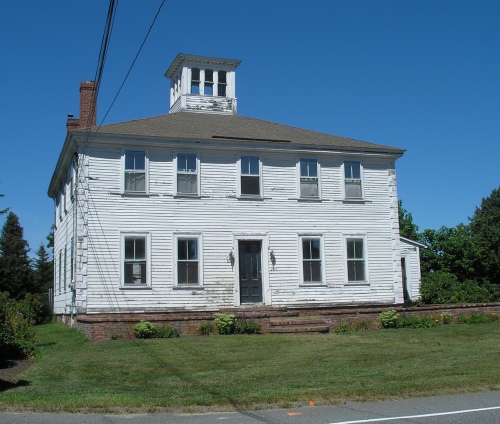John Mycall House (1798)

Stephen Cleverly began constructing the hip-roofed house at 204 Still River Road in Harvard in the early 1790s. As described in the History of the Town of Harvard, Vol. II (1894), by Henry S. Nourse:
Stephen Cleverly, an eccentric genius, son of Dr. John Cleverly, succeeded [the merchant John] Munroe [at Still River] at the close of the Revolution, but his business career was brief and unfortunate. He began the erection of the large dwelling well known as the Mycall or Jerome Gardner house, but his enterprise ended in financial trouble, and he removed to Lancaster with his father. Thereafter he indulged his taste for strong drink, became besotted and insane, and died at the age of seventy-two, A. D. 1832, in the alms-house. He was an educated man, had a talent for rhyming, and in his later years was wont to wander about, half-tipsy, repeating whenever he could find listeners certain scurrilous verses of his own composition, in which he satirized his fellow- men and scoffed at the world in general.
Cleverly’s creditors sold his unfinished house to John Mycall in 1798. Originally from Worcester, England, John Mycall (1757-1840) had emigrated to Newburyport in 1775, where he was editor of the Essex Journal from 1780 to 1790. Mycall operated a retail shop in the rear ell of his house in Harvard. Again quoting from Nourse:
Of John Mycall, when publisher at Newburyport, the following story has been more than once printed. The sheriff had been a regular subscriber to the Journal for a long time, but failed to pay the bills presented to him, save in profuse promises. One day, being urgently pressed for the amount due, the sheriff with his usual earnest manner, said: “Mr. Mycall, you shall have your money tomorrow, if I am alive; you may be certain I am a corpse if you are not paid in full.” When the sheriff began reading the next issue of the paper he was astounded to find staring him in the face the formal announcement of the “sudden death of Philip Bagley, Esq, Sheriff of Essex County,” followed by a flattering obituary, which closed with the sentence: “Alas! Sheriff Bagley had one grave fault—he neglected to pay the printer.” He threw down the sheet in a rage and rushed out to contradict the report. He met several acquaintances, but no one seemed at all surprised to see him in his usual vigor, until he entered the printing office. The publisher put on a look of grave astonishment, ejaculating: “Why, Mr. Sheriff, I thought you a corpse.” “Who told you so?” asked the angry official. “Why, you yourself were my authority”— and he recalled the solemn promise. The sheriff drew his wallet, paid the bill, and demanded that the statement be contradicted in the next week’s Journal. “O,” said Mycall, “that isn’t at all necessary; the notice was printed in but one copy of the Journal; that one sent to you.”
[In 1808] Squire Mycall became entangled in some litigation with Joseph Stone, shook Harvard dust from his feet and returned to Newburyport, where he died.
Mycall’s Harvard property was sold to Jerome Gardner, a merchant and prominent citizen who held a number of local offices. After the Civil War, the house served for a time as a summer hotel, run by Merrick Puffer. In the mid-nineteenth century, the house’s original center chimney was removed and replaced by an Italianate cupola.
Do you know anything about the original owners of the Seven Wells Farm house, which is on the same street, near Bellevue Cemetery, around 154 Still River Rd? The plaque and Zillow.com say it’s 1734, although I have no way of knowing if the date is accurate.
The house is described here: http://mhc-macris.net/Details.aspx?MhcId=HRV.75
From there you can download the pdf file with info. Part of what it says is: “The Thomas Willard House occupies two acres and stands as one of Harvard’s earliest extant structures. This one and a half story, brick , gable block dates to 1758.”